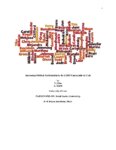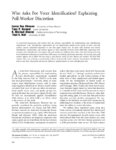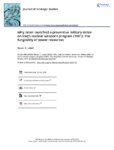1 - 25 of 13
| Creator | Title | Description | Subject | Date | ||
|---|---|---|---|---|---|---|
| 1 |
 |
Francis, John G.; Lubomudrov, Slava | Precinct straddling of city boundaries | Suppose a situation in which citizens of a particular city vote in county, state and national elections, but in which their combined vote for each candidate is not clearly separable from the votes of residents of adjacent areas outside of the city. It can be argued that the inability to identify th... | Residents; Voting; Elections | 1978 |
| 2 |
 |
Cline, Nicole L.; Martz, Amy Louise | Increasing political participation in the LGBT community in Utah | Discriminatory practices and hate crimes against members of the Lesbian, Gay, Bi-sexual and Transgendered (LGBT) community runs as deep as societies themselves. Throughout history the social roles that various segments of the LGBT community have been both highly regarded as well as despised in human... | LGBT; Politics; Voting; Elections | 2013 |
| 3 |
 |
Olson, Susan M. (Susan Marie), 1949- | Revisiting Informal Justice: Restorative Justice and Democratic Professionalism | Debates over informal or popular justice recur periodically in sociolegal | Informal justice; Sociolegal scholarship; Professionalism; Democratic professionalism; Salt Lake City Passages Program | 2003 |
| 4 |
 |
Holzner, Claudio A.; Jameson, Kenneth P.; Maloney, Thomas N.; Abebe, Berhanie; Lund, Matthew; Schaub, Kristen | Economic impact of the Mexico-Utah relationship | This study began during the Summer of 2005 and set out to examine the complexity of the globalized relation between Utah and Mexico, concentrating on broadly defined "economic linkages." It was designed to build upon earlier similar studies done in Arizona and in Texas on those states' relations wit... | Economics, Utah; Migration; Immigration; Mexico; Undocumented immigrants | 2006-03-10 |
| 5 |
 |
Francis, Leslie | Eminent domain compensation in the Western states: a critique of the fair market value model | Both the United States Constitution and the constitutions of the states of the intermountain west and the Pacific Coast prohibit the state from taking property without paying just compensation. Thus, there are two basic issues in any eminent domain case. First, has governmental interference with pro... | Eminent domain; Compensation; Governmental interference; Fair Market Value | 2006-06-16 |
| 6 |
 |
Hall, Thad | Who asks for voter identification? Explaining poll-worker discretion | As street-level bureaucrats, poll workers bear the primary responsibility for implementing voter identification requirements. Voter identification requirements are not implemented equally across groups of voters, and poll workers exercise substantial discretion in how they apply election law. In sta... | 2014-01-01 | |
| 7 |
 |
Hall, Thad | Controlling democracy: the principal-agent problems in election administration | Election reform has become a major issue since the 2000 election, but little consideration has been given to the issues associated with managing them. In this article, we use principal agent theory to examine the problems associated with Election Day polling place voting. We note that Election Day v... | Election reform; Public management; Principal-Agent Theory | 2006-07-20 |
| 8 |
 |
Lobell, Steven E. | Why Israel launched a preventive military strike on Iraq's nuclear weapons program (1981): the fungibility of power reources | In 1981, Israel launched a preventive military strike against a nuclear reactor that Iraq was constructing at the Tuwaitha Nuclear Research Center. The low fungibility of Iraq's power resources, and especially its nuclear weapons program, shaped Israel's decision-making process. First, it motivated ... | Reventive war; Osiraq granular; Theory of balancing; fungibility brittle; Israel power resources | |
| 9 |
 |
Hall, Thad | Are Americans confident their ballots are counted? | Expanding the large literature which investigates the characteristics of citizen and voter trust in government we analyze the heretofore neglected topic of voter trust in the electoral process. In this paper, we present results from three national surveys in which we asked voters the confidence they... | Election reform; Public management; Principal-Agent Theory | 2006-07-20 |
| 10 |
 |
Hall, Thad | How hard can it be: do citizens think it is difficult to register to vote? | Political equality is seen as an intrinsic normative principle for the adequate functioning of a democratic republic. However, it is well documented that in the United States there are many qualified citizens who do not vote, many who do not participate in the political process due to procedural ... | Voting, United States; Voters; Non-voters | 2006-08-31 |
| 11 |
 |
Hall, Thad | Human dimension of elections: how poll workers shape public confidence in elections | The role of voting technologies has received considerable attention since the 2000 election. However, the voter experience at the polling place and especially the voter-poll worker interaction is also of critical importance. Rarely are poll workers considered an arm of the government, even though th... | Poll workers; Voter confidence; Election outcomes; Voter perceptions | 2006-07-20 |
| 12 |
 |
Hall, Thad; Roberts, Brian F. | Military voting and the law: procedural and technological solutions to the ballot transit problem | During the 2000 presidential election controversy in Florida, the ballots submitted by individuals living overseas-especially military voters-were seen as crucial to the election outcome as the margin of potential victory was so small that these ballots could turn the election from one candidate ... | Military, Voting; United States, elections; Absentee Ballot | 2007-01-12 |
| 13 |
 |
Francis, Leslie | Justice through trust: disability and the Outlier problem in Social Contract Theory | The article focuses on the flaws of the social contract theory. It explores how hostile the social contract as a bargaining process has been thought to distance disabled people from contract-based justice. It analyzes the argument that the history of social contract theory exclude the people with di... | Consensus, social sciences; Discrimination; Social contract; Social ethics; Sociology of disability | 2005-10 |
1 - 25 of 13
